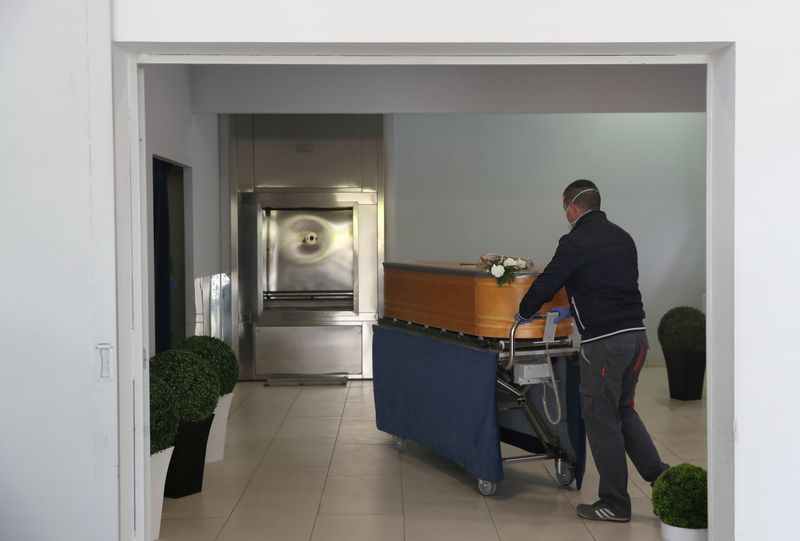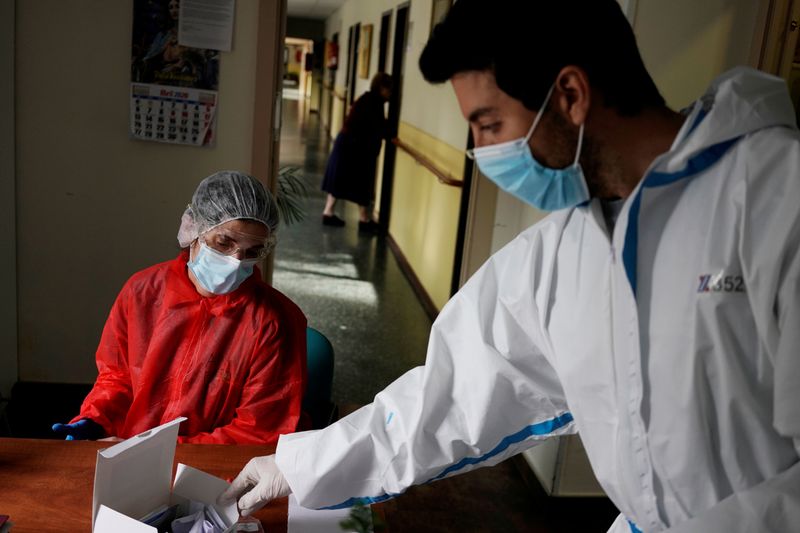By Jesús Aguado and Inti Landauro
MADRID (Reuters) - Spain's daily coronavirus deaths fell to the lowest in more than a month on Friday, prompting the government to declare the most acute phase of the epidemic was over as it prepared criteria to ease one of Europe's strictest lockdowns.
The 367 registered deaths in the previous 24 hours represented just a 1.7% increase overall, down from 440 the previous day, and the lowest since March 21.
However, with 22,524 deaths in total, Spain still has the world's third-highest tally after the United States and Italy.
Cases rose over 6,700 to 219,764 from the day before, but the rise in new infections based on more specific testing was much lower, at 2,796, meaning those cured, at 3,105, surpassed new infections for the first time.
"We have indeed overcome the toughest phase, the most critical phase of the disease, thanks mainly to the effort of the whole Spanish society," government spokeswoman Maria Jesus Montero told a news briefing.
Although calling for prudence due to many yet unknown aspects of the virus, Health Minister Salvador Illa said the epidemic's curve had reversed, allowing the government to plan a gradual exit from a national shutdown since mid-March.
"The direction of the transition will be overseen by the government based on criteria that we will start discussing with the regions this afternoon," he said, without elaborating.
According to Cadena SER radio, the government started to outline thresholds for further easing next month of the economically-crippling lockdown for regions with the lowest contagion rates and least burdened intensive units (ICU).
For restrictions to be lifted, there must be no more than two daily cases per 100,000 people in an area, or COVID-19 patients must occupy no more than half of ICU beds.
ASHES ON PEWS
The government has already taken some steps to relax the lockdown, such as allowing construction workers back and letting children take walks outside from this weekend, but broader restrictions will not be eased until late May.
Anticipating more people outside, the government started capping prices of protective surgical masks at 0.96 euros ($1.04) a piece, and of disinfecting gels and solutions at 0.015-0.021 euros per millilitre depending on packaging volume.
Though fewer, the daily deaths and infections still strain services such as hospitals and funeral parlours.
In Segovia, north of Madrid, dozens of bags with ashes were lined up on the pews of the local crematorium's chapel.
"Here in Segovia, we usually have an average of three to five deaths a day. We have gone to an average of 30 to 40. How are we managing it? By burying them or cremating them as soon as possible in order not to collapse," funeral home director Oscar de la Fuente told Reuters.
In Catalonia, Spain's second hardest-hit region, the regional administration's separatist leader Quim Torra criticised the central government's handling of the epidemic, saying it would have worked out better "without impositions".
He also called for more financial aid.
Torra urged all Catalan political forces to meet and unite policy over the epidemic, accepting a proposal from the opposition Socialists and centre-right Ciudadanos.

He was speaking to just a handful of lawmakers physically present in the Catalan parliament, which was set to approve later on Friday a regional budget for the first time in three years.
